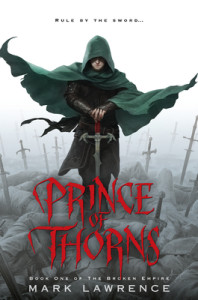 Mark Lawrence’s Broken Empire trilogy, comprised of Prince, King, and Emperor of Thorns, has been one of the most talked-about series in the past several years. Since the “emergence” of dark fantasy in the form of grimdark from the Warhammer 40k universe, various authors have tried their hands at it, and few have been as successful as Mark Lawrence.
Mark Lawrence’s Broken Empire trilogy, comprised of Prince, King, and Emperor of Thorns, has been one of the most talked-about series in the past several years. Since the “emergence” of dark fantasy in the form of grimdark from the Warhammer 40k universe, various authors have tried their hands at it, and few have been as successful as Mark Lawrence.
Honorous Jorg Ancrath was once a privileged young noble, until one (grim) day when his mother and brother were brutally murdered before his very eyes, and he became an outcast, leading a band of brothers who perfectly complement young Jorg’s nature and penchant for violence. Jorg’s rage steadily builds as he is on the road, and he often lashes out, not thinking about consequences. His ambitions are without end, and he will go to any length to accomplish them.
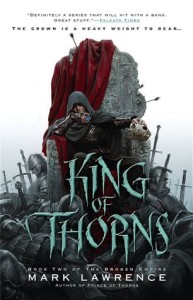 The world of the Broken Empire is a futuristic variant of our modern world, although it has been destroyed and destroyed again in the wars of the Builders, leaving parts of it corrupted by invisible fire (radiation). Remnants of the Builders’ past, including settlements, handguns, and even bombs are still occasionally found, though they are hardly commonplace. One of the more interesting facets of the world are the names of the various kingdoms, duchies, and any other given locations. Many names are completely new, but some, like Normardy and Andaluth, have been altered through the destruction of past civilizations – the former being the Normandy of France and the latter being a region of Spain. Vyene (Vienna) is the seat of the Holy Empire (Holy Roman Empire), in which the various kingdoms of the Broken Empire vote for their new emperor, though as could be assumed from its name, they haven’t had one in some time. It’s a fascinating take on a sort of quasi-alternate-historical-fantasy.
The world of the Broken Empire is a futuristic variant of our modern world, although it has been destroyed and destroyed again in the wars of the Builders, leaving parts of it corrupted by invisible fire (radiation). Remnants of the Builders’ past, including settlements, handguns, and even bombs are still occasionally found, though they are hardly commonplace. One of the more interesting facets of the world are the names of the various kingdoms, duchies, and any other given locations. Many names are completely new, but some, like Normardy and Andaluth, have been altered through the destruction of past civilizations – the former being the Normandy of France and the latter being a region of Spain. Vyene (Vienna) is the seat of the Holy Empire (Holy Roman Empire), in which the various kingdoms of the Broken Empire vote for their new emperor, though as could be assumed from its name, they haven’t had one in some time. It’s a fascinating take on a sort of quasi-alternate-historical-fantasy.
I’ve come across readers who seem to think that the author is being lazy by drawing on parts of our world (or our entire world in another name), as can be seen in Paul Kearney’s Monarchies of God and David Hair’s Moontide Quartet, both being series that I immensely enjoy. I don’t see it as the author being lazy at all – our own history often provides the perfect base for fantasy and science fiction.
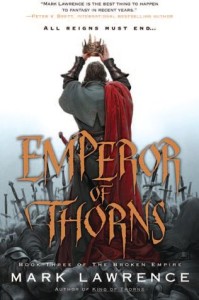 You can’t throw a stone without hitting a review that describes just how anti an anti-hero Jorg is. People are up in arms that someone has dared to infect their perfect genre with a less-than-perfect hero (granted, he’s a fucking bastard). Mark Lawrence simply writes this brutality to see how far he can push it (which is probably significantly farther than what he’s written), Mark Lawrence is only able to write about violence, etc. Some attack the author’s ability rather than just stating why the work didn’t work for them, and I think it takes away from an otherwise informative review when you attack the author. These people are all full of shit.*
You can’t throw a stone without hitting a review that describes just how anti an anti-hero Jorg is. People are up in arms that someone has dared to infect their perfect genre with a less-than-perfect hero (granted, he’s a fucking bastard). Mark Lawrence simply writes this brutality to see how far he can push it (which is probably significantly farther than what he’s written), Mark Lawrence is only able to write about violence, etc. Some attack the author’s ability rather than just stating why the work didn’t work for them, and I think it takes away from an otherwise informative review when you attack the author. These people are all full of shit.*
It’s pretty easy to see how people bail after (or partway through) Prince of Thorns, as Jorg starts out as a piece of shit without any redeeming qualities whatsoever. As he grows, however, he discovers that he does indeed have feelings, and he does have some semblance of humanity, thus making the end of Emperor of Thorns surprisingly moving, barring the epilogue that I would’ve preferred not to exist.
Lawrence’s prose is vivid without being too purple, and it’s a pleasure to read. In and endnote in the back of Emperor of Thorns, he describes why he decided not to milk the series for more books (because I sure as hell would’ve bought more) – he said he’d rather have us yearning for more Jorg than to have us reach a book late in the series and determine for ourselves that we’d had enough. Personally, I think that’s a great decision. Jorg is easily one of the most fascinating characters to enter the realm of fantasy in recent time.
If you haven’t read Mark Lawrence’s Broken Empire, you’re missing out.
*I understand, everyone is allowed to have opinions, blah blah – but said opinions are wrong.**
**I’m just kidding.
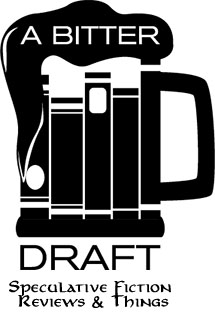
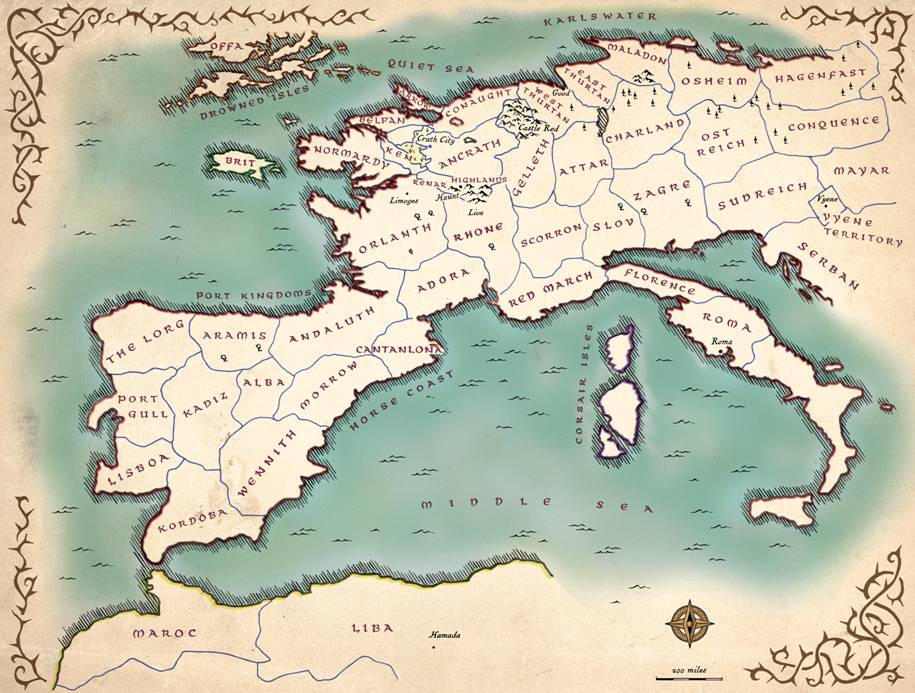
My only issue with the first novel is that he’s a teenager being teenager. It’s great that Lawrence has captured this well, and there’s talk, I believe, amongst historians that this was part of the reason for many minor violent conflicts through out history. I do hope that he grows up some, though. I assume I’ll buy the other two books when they’re on sale.
He definitely matures throughout the series.
Love the series and the fact that Jorg is the anti-hero pictured next to the definition on Merriam-Webster makes it even more a good read.
Good review. Stealing the Map for my Map of Novels collection.